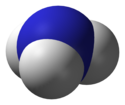Ammonia

| |||
| |||
| Names | |||
|---|---|---|---|
| IUPAC name
Azane
| |||
| Ither names
Hydrogen nitride
Trihydrogen nitride | |||
| Identifiers | |||
3D model (JSmol)
|
|||
| 3DMet | B00004 | ||
| 3587154 | |||
| ChEBI | |||
| ChEMBL | |||
| ChemSpider | |||
| EC Nummer | 231-635-3 | ||
| Gmelin Reference | 79 | ||
| KEGG | |||
| MeSH | Ammonia | ||
PubChem CID
|
|||
| RTECS nummer | BO0875000 | ||
| UNII | |||
| UN nummer | 1005 | ||
| Properties | |||
| NH3 | |||
| Molar mass | 17.031 g/mol | ||
| Appearance | Colourless gas | ||
| Odour | strong pungent odor | ||
| Density | 0.86 kg/m3 (1.013 bar at boiling point) 0.73 kg/m3 (1.013 bar at 15 °C) 681.9 kg/m3 at −33.3 °C (liquid)[1] 817 kg/m3 at −80 °C (transparent solid)[2] | ||
| Meltin pynt | −77.73 °C (−107.91 °F; 195.42 K) | ||
| Bylin pynt | −33.34 °C (−28.01 °F; 239.81 K) | ||
| 47% (0 °C) 31% (25 °C) 28% (50 °C)[3] | |||
| Solubility | soluble in chloroform, ether, ethanol, methanol | ||
| Vapour pressur | 8573 h Pa | ||
| Acidity (pKa) | 32.5 (−33 °C),[4] 10.5 (DMSO) | ||
| Basicity (pKb) | 4.75 | ||
| Refractive index (nD) | 1.3327 | ||
| Viscosity | 0.276 cP (-40 °C) | ||
| Structur | |||
| Molecular shape | Trigonal pyramid | ||
| 1.42 D | |||
| Thermochemistry | |||
| Staundart molar entropy S |
193 J·mol−1·K−1[5] | ||
| Std enthalpy o formation ΔfH |
−46 kJ·mol−1[5] | ||
| Hazards | |||
| GHS pictograms |     [6] [6]
| ||
| GHS hazard statements | H221, H280, H314, H331, H400[6] | ||
| GHS precautionary statements | P210, P261, P273, P280, P305+351+338, P310[6] | ||
| NFPA 704 | |||
| Flash pynt | flammable gas (see text) | ||
| Explosive leemits | 15–28% | ||
| Lethal dose or concentration (LD, LC): | |||
LD50 (Median dose)
|
0.015 mL/kg (human, oral) | ||
| US heal exposur leemits (NIOSH): | |||
PEL (Permissible)
|
50 ppm (25 ppm ACGIH- TLV; 35 ppm STEL) | ||
| Relatit compoonds | |||
Ither cations
|
Phosphine Arsine Stibine | ||
Except whaur itherwise notit, data are gien for materials in thair staundart state (at 25 °C [77 °F], 100 kPa). | |||
| Infobox references | |||
Ammonia or azane is a compoond o nitrogen an hydrogen wi the formula NH3. It is a colourless gas wi a characteristic pungent smell. Ammonia contreibutes signeeficantly tae the nutreetional needs o terrestrial organisms bi serving as a precursor tae fuid an fertilizers. Ammonia, either directly or indirectly, is an aa a biggin-block for the synthesis o mony pharmaceuticals an is uised in mony commercial cleanin products. Altho in wide uise, ammonia is baith caustic an hazardous. The global industrial production o ammonia for 2012 wis anticipatit tae be 198 million tonnes,[7] a 35% increase ower the estimatit 2006 global output o 146.5 million tonnes.[8]
NH3 boils at −33.34 °C (−28.012 °F) at a pressur o 1 atmosphere, so the liquid must be stored unner heich pressur or at law temperatur. Hoosehauld ammonia or ammonium hydroxide is a solution o NH3 in watter. The concentration o such solutions is measured in units o the Baumé scale (density), wi 26 degrees baumé (aboot 30% (by weight) ammonia at 15.5 °C) bein the teepical heich-concentration commercial product.[9]
References
[eedit | eedit soorce]- ↑ Yost, Don M. (2007). "Ammonia and Liquid Ammonia Solutions". Systematic Inorganic Chemistry. READ BOOKS. p. 132. ISBN 1-4067-7302-6.
- ↑ Blum, Alexander (1975). "On crystalline character of transparent solid ammonia". Radiation Effects and Defects in Solids. 24 (4): 277. doi:10.1080/00337577508240819.
- ↑ Perry, Dale L.; Phillips, Sidney L. (1995). Handbook of inorganic compounds. CRC Press. p. 17. ISBN 0-8493-8671-3.CS1 maint: multiple names: authors leet (link)
- ↑ Perrin, D. D., Ionisation Constants of Inorganic Acids and Bases in Aqueous Solution; 2nd Ed., Pergamon Press: Oxford, 1982.
- ↑ Jump up to: a b Zumdahl, Steven S. (2009). Chemical Principles 6th Ed. Houghton Mifflin Company. p. A22. ISBN 0-618-94690-X.
- ↑ Jump up to: a b c Sigma-Aldrich Co. Retrieved on 2013-07-20.
- ↑ Ceresana. "Market Study Ammonia". Ceresana. Archived frae the original on 9 October 2019. Retrieved 7 November 2012.
- ↑ Max Appl (2006). Ammonia, in Ullmann's Encyclopedia of Industrial Chemistry. Weinheim: Wiley-VCH. doi:10.1002/14356007.a02_143.pub2.
- ↑ "Ammonium hydroxide physical properties" (PDF). Archived frae the original (PDF) on 27 November 2007. Retrieved 17 December 2013.Archived 2007-11-27 at the Wayback Machine



